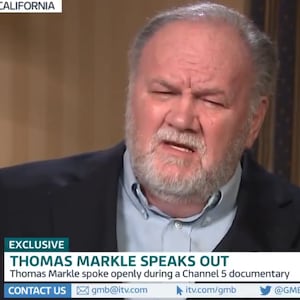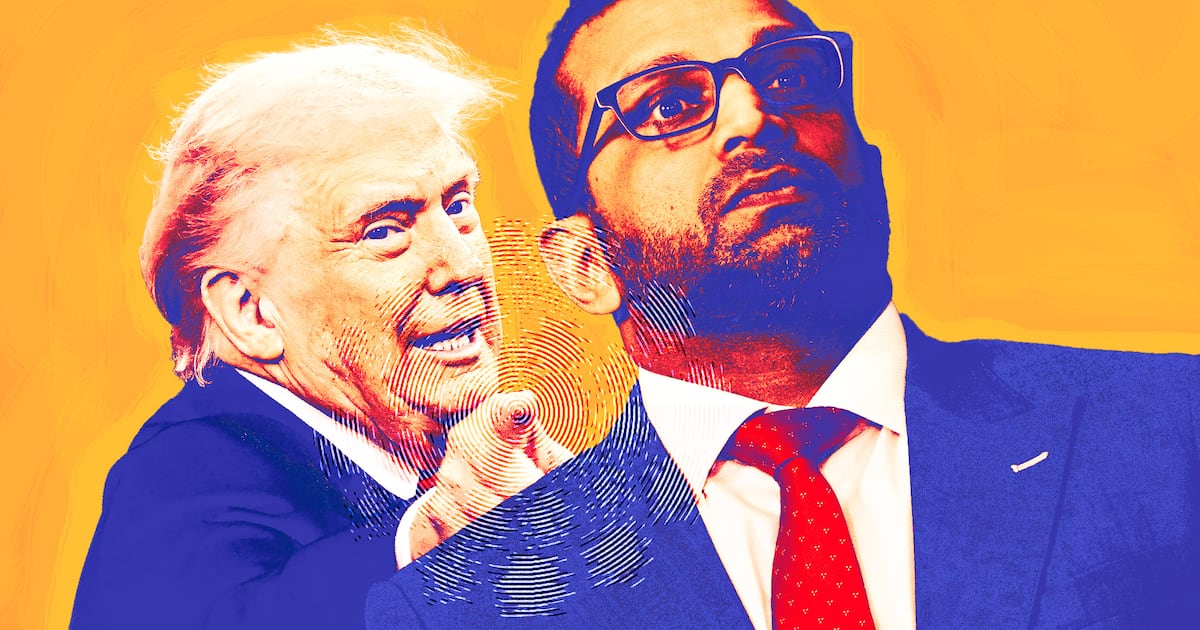Thomas Markle was recently on the British television show Good Morning Britain, complaining about his favorite subject, estranged daughter Meghan, and how unfairly treated by her and Prince Harry he feels.
“You do acknowledge that doing interviews will not make it easier?” anchor Susanna Reid asked Markle.
“There is no other way to reach them,” he responded, the “them” being his daughter who does not want to talk to him and his son-in-law. In other words, she’s “no contact,” which means quite literally no longer making contact or accepting contact with a loved one. It’s a move that is well-known in the world of toxic relationships.
Not many people understand why a child would cut a parent off, least of all, it seems, Piers Morgan, Reid’s co-presenter and Meghan Markle’s U.K. media agitator-in-chief. Glazing over his colleague’s questioning, he chimed in and attempted to garner empathy for Markle, asserting that Meghan and Harry cut Thomas off for missing the wedding because “they just didn’t believe your health problems were so bad you couldn’t fly.”
This weekend, Sun Online reported that Meghan and Harry don’t want Meghan’s mom, Doria Ragland, to become Thomas’ “pawn” after he revealed he had written to Doria to ask if she could help reconnect him with Meghan.
What a mess—and a triggering mess for me and many other women.
After the Good Morning Britain interview, I immediately logged onto Facebook and made my way to the group I’m in for daughters of narcissistic or toxic fathers. It’s a place of refuge when I’m feeling uneasy or tasked with dealing with my own father’s hurtful behavior.
It’s a place where thousands of women or women-identifying people from around the world, from teenaged to middle-aged and older, can openly ask for advice or just vent about the troubled relationships they have with their parent. Other members lend their support or advice in the comments, which can range from heart emojis to YouTube videos and educational articles. When I got there, there was already a thread about Markle’s comments. The comments ranged from rage to disgust to hurt for Meghan.
I do not know the reality of the situation between Thomas and Meghan, I admit that—but in how he has treated Meghan publicly I feel a strong personal echo of what it is to be a child targeted in such a way by their parent. I am far from alone.
Markle’s attacks against his daughter have gone on for a while, at least publicly since he pulled out of her 2018 wedding to Prince Harry. And, lately, it seems they’ve been a lot more frequent. In the same week he spoke with Piers Morgan—adding that he did not believe she was subject to racism as a royal in the media—he accused his daughter of “cheapening” the royal family and a week later threatened her with weekly interviews until she loved him again. The group has followed it all.
We’re familiar with the tactics of our abusive fathers that mimic Markle’s, whether we are in contact with them or not. We know the feeling of having someone who is supposed to love you the most respect your boundaries the least, and use emotionally manipulative tactics as Markle has (like when he says he misses his grandchild or asks for money) to get you to have a relationship with them again.
We have been lied to, gaslit, trash-talked, and guilt-tripped by either the toxic parent or by those around us who just don’t get it. Like Meghan, many of us have been told we’re the wrong ones for protecting ourselves or to just get over the pain they may have caused us, because they love us, and isn’t that enough? We are asked: why are we trying to hurt them? And if that doesn’t make us come “back,” we will be sure to regret it. And also, if we don’t, they may die—and their death will be our fault.
Dr. Ramani Durvasula, a clinical psychologist and author of works about toxic behavior including Should I Stay or Should I Go?: Surviving a Relationship With a Narcissist, told The Daily Beast that while she can’t diagnose Markle without knowing him, his actions line up with attributes of toxic behavior.
“He’s making very public what should be a private conversation,” she said. “At the end of the day, when boundaries are being violated, it can definitely qualify as abusive. It’s a bad lesson on how to be a parent.”
It is likely the reason that myself, and others in the group, feel the pain so deeply as we watch this all play out. It’s like we’re watching our own lives on a much larger scale. The same week I watched the Piers Morgan interview, my own dad texted me from a fourth new number in an attempt to reach me, despite me asking him for some space.
I’m not the only one. One woman from the group echoed what many replied in the comments of stories on the Markles: that he reminds her of her own father.
“I get anxious when reading or hearing the degrading things he says about Meghan and Harry. It’s all too familiar,” she told The Daily Beast. She explained her own father behaves in ways that are degrading or disrespectful of boundaries, and allegedly threatens her when things don’t go his way.
Another says her experiences make her empathetic toward Meghan: “I understand how hard it is to deal with a situation like this. I grew up with a man just like him.”
The Markle relationship is one that triggers us, but also helps us feel seen. Daughters of fathers with narcissistic traits struggle with issues like anxiety and depression at a rate higher than our peers without a toxic parent in the picture, due to both the abuse and the silence that comes from the shame associated with the subject.
Dr. Stephanie Kriesberg, Pys. D., who has experience studying and counseling victims of narcissistic parent and child relationships, called the daughters who carry this burden “a secret society.”
“[Toxic fathers] can look very different in public than they do in private. Plus, our society doesn’t endorse the idea that we can be critical of our parents,” said Dr. Kriesberg. She didn’t want to comment on Meghan, specifically, but made a broader point: “Society doesn’t expect a woman who says, ‘I’m not inviting my father to my wedding.’”
The result? Daughters of toxic fathers like me grasp at any chance to feel like someone gets it. The situation between Meghan and her dad has triggered us, but at the same time, made us feel so much less alone. Though all fathers who exhibit narcissistic or toxic traits have different styles of abuse—from the silent treatment to threats—Dr. Kriesberg says the common thread among their daughters is rejection. And those of us who experience it find healing and validation in each other, and though she may not know it, Meghan.
A week ago, in a Meghan Markle thread, everything came to a head when a group member officially dubbed her our patron saint: The Patron Saint of Daughters of Toxic Men.
The more Markle chooses to speak ill of his daughter, the more I empathize with her. This, in turn, helps me empathize with myself. The toxicity in the language Markle uses toward his daughter has made me see that abusive family dynamics, whether they stem from mental illness or not, does not discriminate. It’s not the fault of the victim of such abuse in parent-child situations; it’s simply the luck of the draw. Sometimes, the person who draws such a card is a princess.
Meghan is not perfect and neither am I. No human being is. There may well be some very valid criticism of her behavior, of how she and Harry have managed their royal lives, and how they have exited from their royal duties.
But watching her face the onslaught of slights from her father is painful for those of us tied to this special kind of parental emotional abuse, who are desperate to find others who understand. We want to feel our experiences and our choices to protect ourselves are valid. Without saying a word, Meghan gives us that.
She didn’t choose to be a very public image of what family toxicity looks like and I’m not 100 percent sure that is how she views the situation—Lord knows she already wants to shed elements of the royal role she has.
But as long as her father lashes out, I will continue to cheer Meghan Markle on, as will many other daughters. With her as an example, we will grow the strength to deal with our own fathers and whatever fallout that decision may bring. We will discuss the interviews that trigger us and relate to the behaviors we find familiar. And, for once, we will not feel alone.







